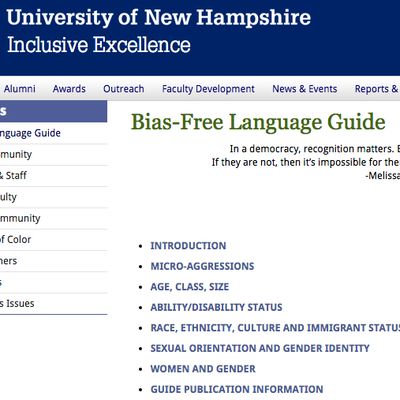
The University of New Hampshire has a “Bias-Free Language Guide.” As the document assures its readers, it “is not meant to represent absolute requirements of language use.” (Universities have tried imposing absolute requirements of language use, only to be struck down on First Amendment grounds.) So the guide should be understood not as an attempt at censorship, which would be illegal, but as a cutting-edge statement of p.c. language norms. It indicates that the list of terms that can give offense has grown quite long indeed.
Some of the assumptions in the guide may confuse readers. For instance, the guide instructs, “avoid stereotypes and words that are derived from negative assumptions e.g., using the expression ‘going Dutch’ for ‘splitting the bill.’” The document does not delve into the question of whether splitting the bill is itself a bad thing. But mostly, the list is just extremely long. Some excerpts of preferred and problematic terminology for the politically correct UNH community:
Preferred: people of advanced age, old people*
Problematic/Outdated: older people, elders, seniors, senior citizen
*Old people has been reclaimed by some older activists who believe the standard wording of old people lacks the stigma of the term “advanced age”. Old people also halts the euphemizing of age. Euphemizing automatically positions age as a negative.
Preferred: person living at or below the poverty line, people experiencing poverty
Problematic/Outdated: poor person, poverty-stricken person
Preferred: person of material wealth
Problematic: rich
Being rich gets conflated with a sort of omnipotence; hence, immunity from customs and the law. People without material wealth could be wealthy or rich of spirit, kindness, etc.
Preferred: people of size
Problematic/Outdated: obese*, overweight people
Preferred: person who is blind/visually impaired
Problematic: blind person, “dumb”
Preferred: U.S. citizen or Resident of the U.S.
Problematic: American
Preferred: White people, European-American individuals
Problematic: Caucasian people
Preferred: Folks, People, You All, Y’all
Problematic/Outdated: Guys (when referring to people overall)
Preferred: Other Sex
Problematic/Outdated: Opposite Sex
Preferred: Children who are gender non-conforming, Children who are gender variant
Problematic/Outdated: Girlie or Tomboy
So let’s review. Consider the following passage: “Guys, I had lunch with Sheldon Adelson, an American senior citizen who hates anybody who is not Caucasian, and he insisted we go Dutch, even though he is really rich and I am poverty-stricken.” There are no fewer than seven problematic terms in that sentence alone. A UNH student or faculty member determined to avoid any linguistic missteps would have to pore over the list of terminology until they go blind become visually impaired.






























